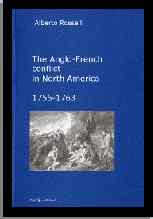
Pubblichiamo di seguito la prefazione di Raimondo Luraghi - Professore Emerito di storia americana dell'Università di Genova - alla recente traduzione americana del volume di Alberto Rosselli (edizioni Erga) sulle conseguenze del conflitto anglo-francese ("guerra dei sette anni") in territorio americano. Il volume ha meritato di esser classificato con cinque stelle nei cataloghi della Libreria del Congresso.
Raimondo Luraghi
the anglo-french conflict in North America, preface

The battle fought on September 13, 1759, on the Plains of Abraham, at the gates of Québec, in Canada, was a fateful one: only the surrender of General Lee at Appomattox Court House in 1865 had such a tremendous influx on the history of North America. The victory scored by the French against the British at S.te Foy seven months later, April 28, 1760, did nothing to change the situation: "Ah! A single ship of the line, and the place would have been ours!" said a French officer speaking of Québec, to whom his English captor answered: " You are quite right!". And by such words, he showed the true cause of French defeat in the war for Canada: the British had command of the sea, and after the fall of Québec in 1759 and the failure to retake it by lack of seapower, their empire of New France was all but doomed. Had Montcalm won the battle and destroyed Wolfe, everything would have been different; or better had he kept closed inside the fortress Québec, waiting for Bougainville and the Indian allies to arrive and hit Wolfe’s Army on its vulnerable reverse, everything would have taken anothet way…Still, these might be vacuous speculations: historical events, indeed, developed as they did, and not as they might have…
The story of la Nouvelle France, which ended dramatically on the Plains of Abraham, had been an epic, heroic and tragic one. Never, in the Northern part of the Continent, had an empire of such extent been built; never had white men collaborated with the Indian nations and flocked to the Jesuit Missions like in French America. Cartier, first, then Champlain had made the fateful choice of the Québec rock and peninsula to build the future capital of New France; then de Maisonneuve had founded Montréal in face of the threatening Iroquois and the Jesuit missionaries had marched into the wilderness, defying the primeval forest, the rapids of the mighty rivers, the harsh climate and the terrible Iroquois, to organize a true chain of Missions. This had costed the French colonists, missionaries and explorers sacrifices and much blood: the internecine struggle between Indian tribes had put them in a collision course with the fearsome Iroquois. Settlements had been destroyed: missionaries martyred; yet in the end French tenacity had triumphed. Now, with the defeat at Québec all was finished forever. "The River of Cartier" wrote Bernard DeVoto, "was English. Champlain, Frontenac, La Salle, Jolliet, the martyred Jesuits, Perrot, Duluth, Vérendrye, the shining company of great, farseeing men moved beyond the sunset into the dark, leaving North America only a memory of their dream". As Francis Parkman had said, "The most momentous and far-reaching question ever brought to issue on this Continent was: Shall the United States be one nation or two?". Yet, the first one, as formulated by Parkman, was really one of the two by whom the destiny of the Continent depended. The heroic story of the French empire in North America deserved an end worth of an epic poem: and such was the battle of Québec. This is why it had since then fascinated readers, historians and scholars alike; and not only in the New World. That French writers, like Etienne Salone, would be attracted by the epics of la Nouvelle France, is almost obvious. Yet Alberto Rosselli is an Italian: and I hear the inevitable question rising: "how was he interested in the story of New France?".
Rosselli was a very thoughtful and deep-insighted young student in the school of North American history at the University of Genoa. Founded by myself in the now distant Academic Year 1964-65, it was the first school all over Italy to study North America as a whole, starting from the tenuous beginning of the Colonial age, when Canada was little more than a geographic expression, and the United States still lay concealed in the distant future. To the history of the French American-empire much time was dedicated in Genoa; and students of the genoese school were the first in Italy to "discover" the amazing history of New France and, attracted by it, to venture beyond the Ocean, thanks, sometimes, to Canadian research grants, to study French Canadian history with the help of such scholars as the late William J. Eccles, to whom the University of Genoa conferred the honoris causa .
Alberto Rosselli, a bright student, started very early to work in this field. His choice of the battle of Québec as a subject of his first research, dated from his graduation Thesis, which, in turn, generated this dense and rich book.
I believe that it is good that an Italian scholar would have dedicated himself to such argument, because he was and is able to bring to Canadian studies a refreshing perspective, even a new dimension. Not involved in the (sometimes nasty) quarrels between francophone and anglophone historians, he enjoyed an impartial viewpoint which is not only free from any prejudice, but also endowed by a long historical perspective which affords him the invaluable opportunity of looking at events "from afar", so being more capable, maybe, to distinguish between lights and shadows better than historians too closely involved in local situations and problems. At any rate, this book is a remarkable contribution to the study of an historical saga which does not cease to fascinate both scholars and readers alike; and which is a key to understanding better the complex problems of to-day North-America.